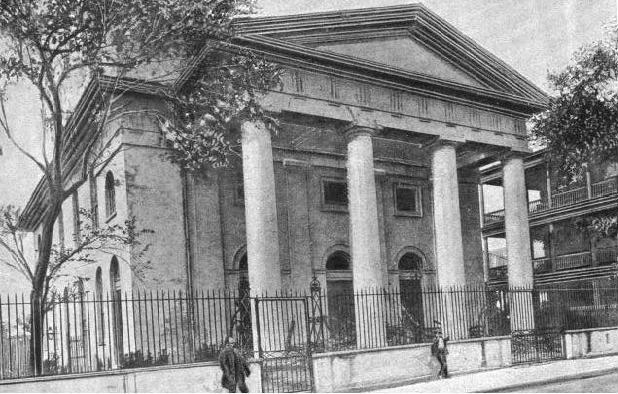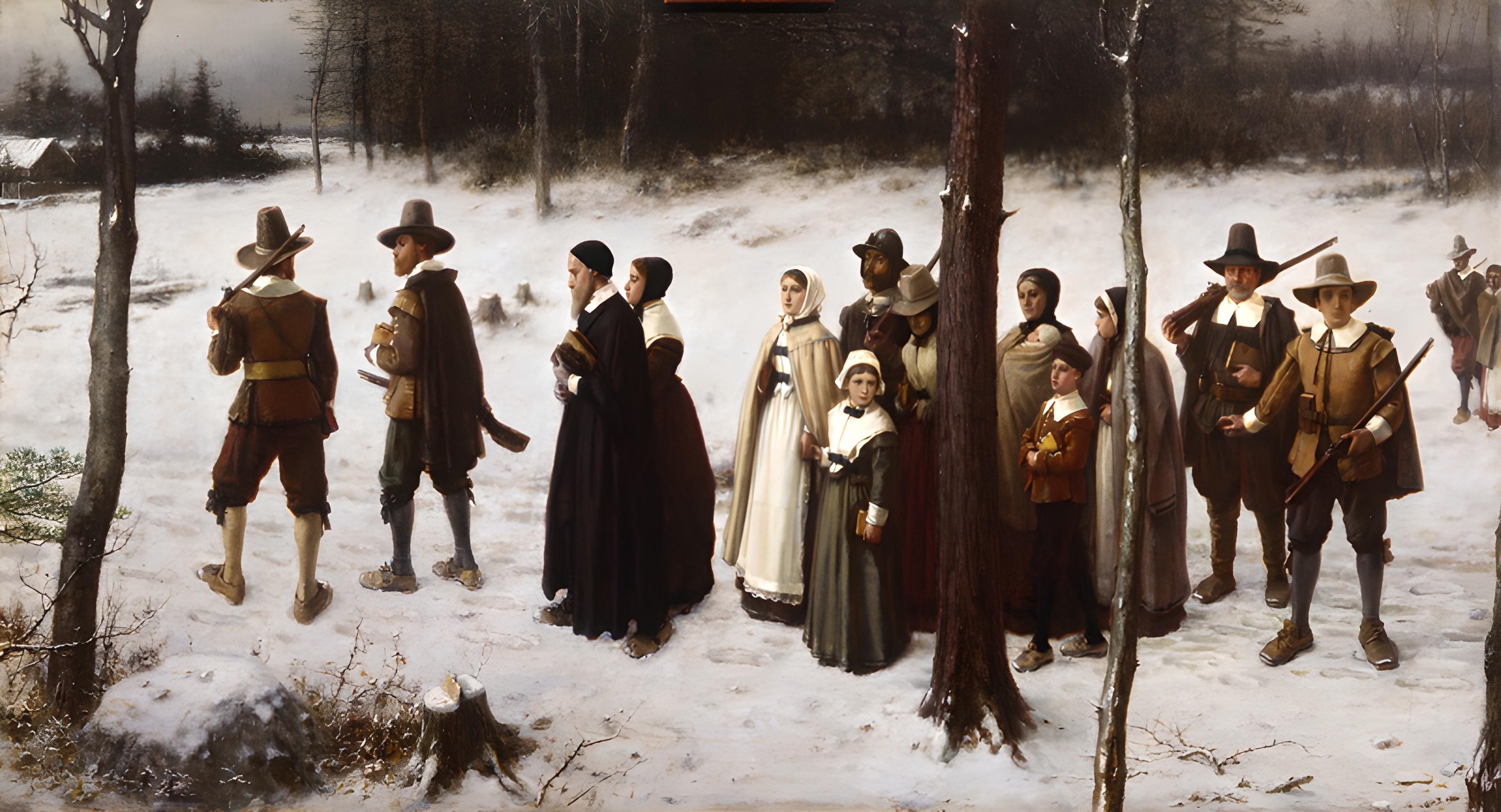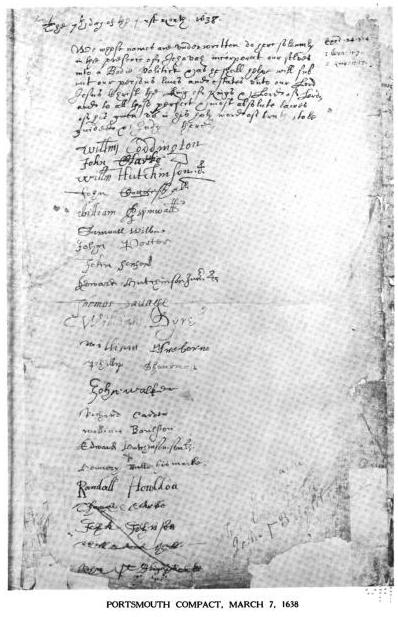|
First Baptist Church (Boston, Massachusetts)
The First Baptist Church (or "Brattle Square Church") is a historic American Baptist Churches USA congregation, established in 1665. It is one of the oldest Baptist churches in the United States. It first met secretly in members homes, and the doors of the first church were nailed shut by a decree from the Puritans in March 1680. The church was forced to move to Noddle's Island. The church was forced to be disguised as a tavern and members traveled by water to worship. Rev. Dr. Stillman led the church in the North End for over 40 years, from 1764 to 1807. The church moved to Beacon Hill in 1854, where it was the tallest steeple in the city. After a slow demise under Rev. Dr. Rollin Heber Neale, the church briefly joined with the Shawmut Ave. Church, and the Warren Avenue Tabernacle, and merged and bought the current church in 1881, for $100,000.00. Since 1882 it has been located at the corner of Commonwealth Avenue and Clarendon Street in the Back Bay. The interior is curr ... [...More Info...] [...Related Items...] OR: [Wikipedia] [Google] [Baidu] |
Boston, Massachusetts
Boston is the capital and most populous city in the Commonwealth (U.S. state), Commonwealth of Massachusetts in the United States. The city serves as the cultural and Financial centre, financial center of New England, a region of the Northeastern United States. It has an area of and a population of 675,647 as of the 2020 United States census, 2020 census, making it the third-largest city in the Northeastern United States after New York City and Philadelphia. The larger Greater Boston metropolitan statistical area has a population of 4.9 million as of 2023, making it the largest metropolitan area in New England and the Metropolitan statistical area, eleventh-largest in the United States. Boston was founded on Shawmut Peninsula in 1630 by English Puritans, Puritan settlers, who named the city after the market town of Boston, Lincolnshire in England. During the American Revolution and American Revolutionary War, Revolutionary War, Boston was home to several seminal events, incl ... [...More Info...] [...Related Items...] OR: [Wikipedia] [Google] [Baidu] |
Heresy
Heresy is any belief or theory that is strongly at variance with established beliefs or customs, particularly the accepted beliefs or religious law of a religious organization. A heretic is a proponent of heresy. Heresy in Heresy in Christianity, Christianity, Heresy in Judaism, Judaism, and Bid‘ah, Islam has at times been met with censure ranging from excommunication to the death penalty. Heresy is distinct from apostasy, which is the explicit renunciation of one's religion, principles or cause; and from blasphemy, which is an impious utterance or action concerning God or sacred things. Heresiology is the study of heresy. Etymology Derived from Ancient Greek ''haíresis'' (), the English ''heresy'' originally meant "choice" or "thing chosen". However, it came to mean the "party, or school, of a man's choice", and also referred to that process whereby a young person would examine various philosophies to determine how to live. The word ''heresy'' is usually used within a C ... [...More Info...] [...Related Items...] OR: [Wikipedia] [Google] [Baidu] |
First Baptist Church (Charleston, South Carolina)
First Baptist Church is a Baptist church in Charleston, South Carolina. It is affiliated with the Southern Baptist Convention. The congregation was founded in 1682 under the leadership of William Screven. It is one of the oldest Baptist congregations in the American South. The church congregation was originally organized in Kittery, Maine (then part of Massachusetts) under the guidance of the First Baptist Church of Boston. In 1696 twenty-six congregants followed Pastor Screven and moved to Charleston after being pressured by the New England Congregationalist authorities. The relocated congregation became the First Baptist Church of Charleston. Pastor Screven recommended that any future pastor be "orthodox in faith, and of blameless life, and does own the 1689 Baptist Confession of Faith, confession of faith put forth by our brethren in London in 1689" declaring the church to be firmly Calvinist (Reformed Baptist). First Baptist Church is currently affiliated with the Southern B ... [...More Info...] [...Related Items...] OR: [Wikipedia] [Google] [Baidu] |
Charleston, South Carolina
Charleston is the List of municipalities in South Carolina, most populous city in the U.S. state of South Carolina. The city lies just south of the geographical midpoint of South Carolina's coastline on Charleston Harbor, an inlet of the Atlantic Ocean formed by the confluence of the Ashley River, Ashley, Cooper River (South Carolina), Cooper, and Wando River, Wando rivers. Charleston had a population of 150,227 at the 2020 United States census, 2020 census. The population of the Charleston metropolitan area, South Carolina, Charleston metropolitan area, comprising Berkeley County, South Carolina, Berkeley, Charleston County, South Carolina, Charleston, and Dorchester County, South Carolina, Dorchester counties, was estimated to be 849,417 in 2023. It ranks as the South Carolina statistical areas, third-most populous metropolitan area in the state and the Metropolitan statistical area, 71st-most populous in the U.S. It is the county seat of Charleston County, South Carolina, Ch ... [...More Info...] [...Related Items...] OR: [Wikipedia] [Google] [Baidu] |
Congregationalism In The United States
Congregationalism in the United States consists of Protestantism, Protestant churches in the Reformed tradition that have a Congregationalist polity, congregational form of church government and trace their origins mainly to Puritans, Puritan settlers of colonial New England. Congregational churches in other parts of the world are often related to these in the United States due to American Christian mission, missionary activities. These principles are enshrined in the Cambridge Platform (1648) and the Savoy Declaration (1658), Congregationalist confession of faith, confessions of faith. The Congregationalist Churches are a continuity of the theological tradition upheld by the Puritans. Their genesis was through the work of Congregationalist divines Robert Browne (Brownist), Robert Browne, Henry Barrowe, and John Greenwood (divine), John Greenwood. Congregational churches have had an important impact on the religious, political, and cultural history of the United States. Congreg ... [...More Info...] [...Related Items...] OR: [Wikipedia] [Google] [Baidu] |
Kittery, Maine
Kittery is a town in York County, Maine, United States, and the oldest incorporated town in Maine. Home to the Portsmouth Naval Shipyard on Seavey's Island, Kittery includes Badger's Island, the seaside district of Kittery Point, and part of the Isles of Shoals. The southernmost town in the state, it is a tourist destination known for its many outlet stores. Kittery is part of the Portland-South Portland-Biddeford metropolitan area. The town's population was 10,070 at the 2020 census. History English settlement around the natural harbor of the Piscataqua River estuary began about 1623. By 1632 the community was protected by Fort William and Mary on today's New Hampshire side of the river; in 1689 defensive works that later became Fort McClary in Kittery Point were added on today's Maine side to the north. Kittery was incorporated in 1647, staking a claim as the "oldest incorporated town in Maine." It was named after the birthplace of a founder, Alexander Shapleigh, ... [...More Info...] [...Related Items...] OR: [Wikipedia] [Google] [Baidu] |
William Screven
William Screven (c. 1629 – 1713) was a 17th-century Reformed Baptist church planter and preacher from England who founded the first Baptist church in the South. William Augustine Screven was born in the town of Somerton in Somerset, England in 1629, and emigrated to New England in the 1640s. In the 1670s, Screven was baptized at the First Baptist Church in Boston by John Myles, pastor of the First Baptist Church in Swansea, who was also serving as pastor of the nearby Boston church during King Philip's War. Screven was ordained in January 1682 by the First Baptist Church of Boston, so that he might establish a church in Kittery, Maine, which he did on September 25 of that year. In 1696, the new church moved to Charleston, South Carolina at least partly because of disagreements between the Rev. Mr. Screven and the New England Baptist authorities. According to family tradition, however, Screven and his band of ten followers were escorted to the edge of town by the local P ... [...More Info...] [...Related Items...] OR: [Wikipedia] [Google] [Baidu] |
Samuel Stillman
Samuel Stillman (1737–1807) was an American Baptist minister. From 1765 until his death in 1807, Stillman served as pastor of Boston's First Baptist Church of Boston, Massachusetts; for these 42 years, Stillman was considered "the leading Baptist minister in New England, if not the United States." Stillman was an original trustee of Rhode Island College (now Brown University) and played a leading role in the establishment of the Massachusetts Baptist Missionary Society in 1802. Life Samuel Stillman was born on February 27 O.S.">Old_Style_and_New_Style_dates.html" ;"title="nowiki/>Old Style and New Style dates">O.S. 1737 in Philadelphia, Province of Pennsylvania. In 1748, the Stillman family moved to Charleston, South Carolina, Charleston, Province of South Carolina. Stillman's inclination for the ministry was recognized by Oliver Hart of the First Baptist Church of Charleston. Hart converted and baptized Stillman in 1754 and immediately began training him for ministerial s ... [...More Info...] [...Related Items...] OR: [Wikipedia] [Google] [Baidu] |
First Baptist Church In Swansea
The First Baptist Church in Swansea is a historic Baptist church in the town of Swansea, Massachusetts. The church, established in 1663, with history going back to 1649, is the oldest Baptist congregation in Massachusetts and one of the oldest in the United States. History The congregation was founded in 1649, in Wales, by the Puritan Baptist minister John Myles. Myles brought the Ilston Book with him from Swansea, Wales, and fled to Massachusetts with the Ilston congregation, in 1662, becoming the first Baptist church in Massachusetts, in 1663. The congregation in Swansea, Massachusetts, was located relatively nearby the First Baptist Church of Providence, in Rhode Island. Building The current Greek Revival chapel was constructed in 1848 and is the fifth building occupied by the congregation. The adjacent cemetery dates to 1731. The building and cemetery were added to the National Register of Historic Places in 1990. See also *National Register of Historic Places listi ... [...More Info...] [...Related Items...] OR: [Wikipedia] [Google] [Baidu] |
John Myles (minister)
John Myles (c. 1621–1683) was an Welsh Baptist minister, founder of Swansea, Massachusetts, and founder of the earliest recorded Baptist churches in Wales (UK) and Massachusetts (US). Life John Myles was born in Wales around 1621. He was educated at Brasenose College at Oxford University. After the conclusion of his studies, Myles traveled to London where he attended the Glasshouse Church, one of the earliest Baptist churches in London. There Myles became conviced of credobaptism, in contrast to paedobaptism, then afterwards returned to Ilston, Wales, where he was appointed minister and served in Wales from 1649 to 1662. He also served as a "tryer" for ministers under the Commonwealth of England, governed by Oliver Cromwell. After the restoration of the monarchy, in 1660, and the requirement for all Puritan clerics to adhere to the Book of Common Prayer, in 1662, Myles and the Ilston congregation left England for the Plymouth Colony. Myles took the historic Ilston Book to N ... [...More Info...] [...Related Items...] OR: [Wikipedia] [Google] [Baidu] |
King Philip's War
King Philip's War (sometimes called the First Indian War, Metacom's War, Metacomet's War, Pometacomet's Rebellion, or Metacom's Rebellion) was an armed conflict in 1675–1678 between a group of indigenous peoples of the Northeastern Woodlands against the English New England Colonies and their indigenous allies. The war is named for Metacom (alternatively Metacomet), the Pokanoket chief and sachem of the Wampanoag who had adopted the English name Philip because of the friendly relations between his father Massasoit and the Plymouth Colony. The war continued in the most northern reaches of New England until the signing of the Treaty of Casco Bay on April 12, 1678. Massasoit had maintained a long-standing agreement with the colonists and Metacom (), his younger son, became the tribal chief in 1662 after his father's death. Metacom, however, forsook his father's alliance between the Wampanoags and the colonists after repeated violations by the latter. The colonists insist ... [...More Info...] [...Related Items...] OR: [Wikipedia] [Google] [Baidu] |
John Clarke (Baptist Minister)
John Clarke (October 1609 – 20 April 1676) was a New England English-born politician, physician, and General Baptist minister, co-founder of the Colony of Rhode Island and Providence Plantations, author of its influential charter, and a leading advocate of religious liberty in America. Clarke was born in Westhorpe, Suffolk, England. He received an extensive education, including a master's degree in England followed by medical training in Leiden, Holland. He arrived at the Massachusetts Bay Colony in 1637 during the Antinomian Controversy and decided to go to Aquidneck Island with many exiles from the conflict. He became a co-founder of Portsmouth and Newport, Rhode Island, and established America's second Baptist church in Newport. Baptists were declared heretics in Massachusetts and were banned there, but Clarke wanted to make inroads there and spent time in the Boston jail after making a mission trip to the town of Lynn, Massachusetts. Following his poor treatment in ... [...More Info...] [...Related Items...] OR: [Wikipedia] [Google] [Baidu] |






